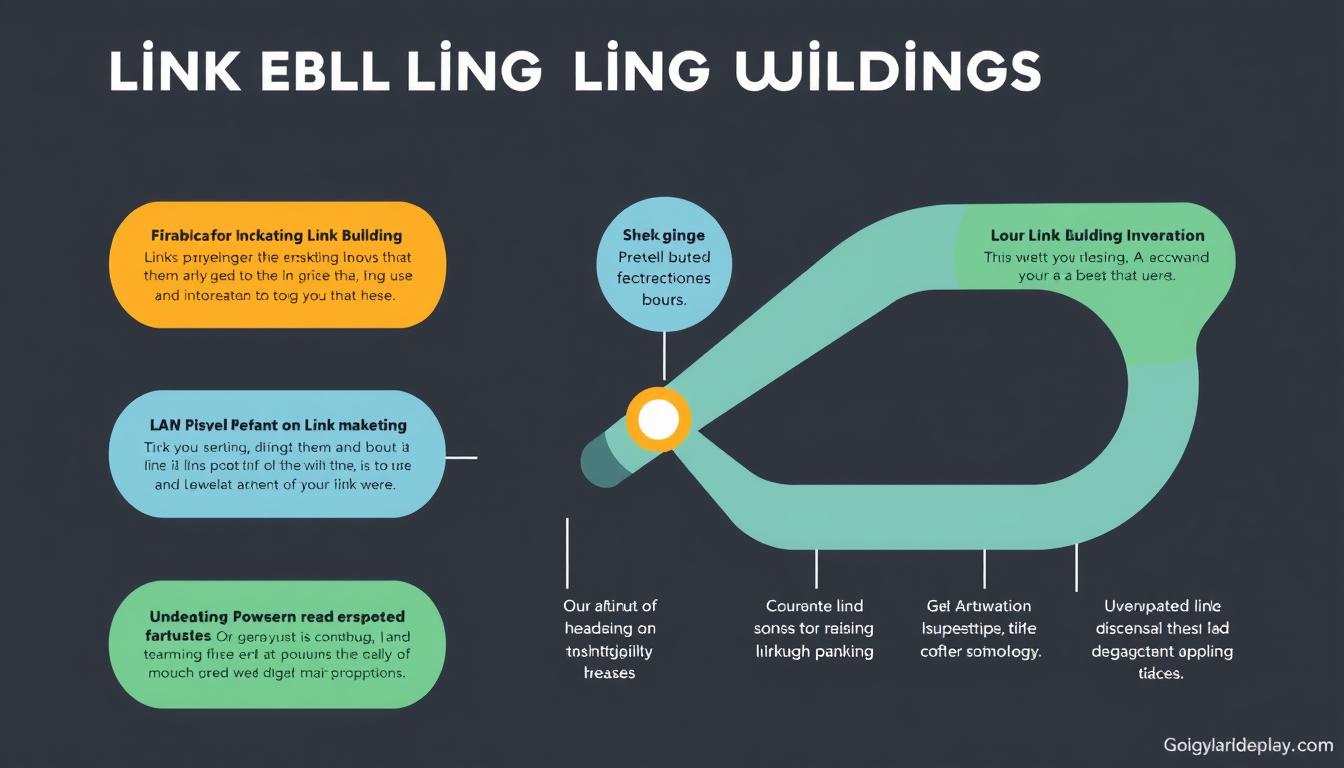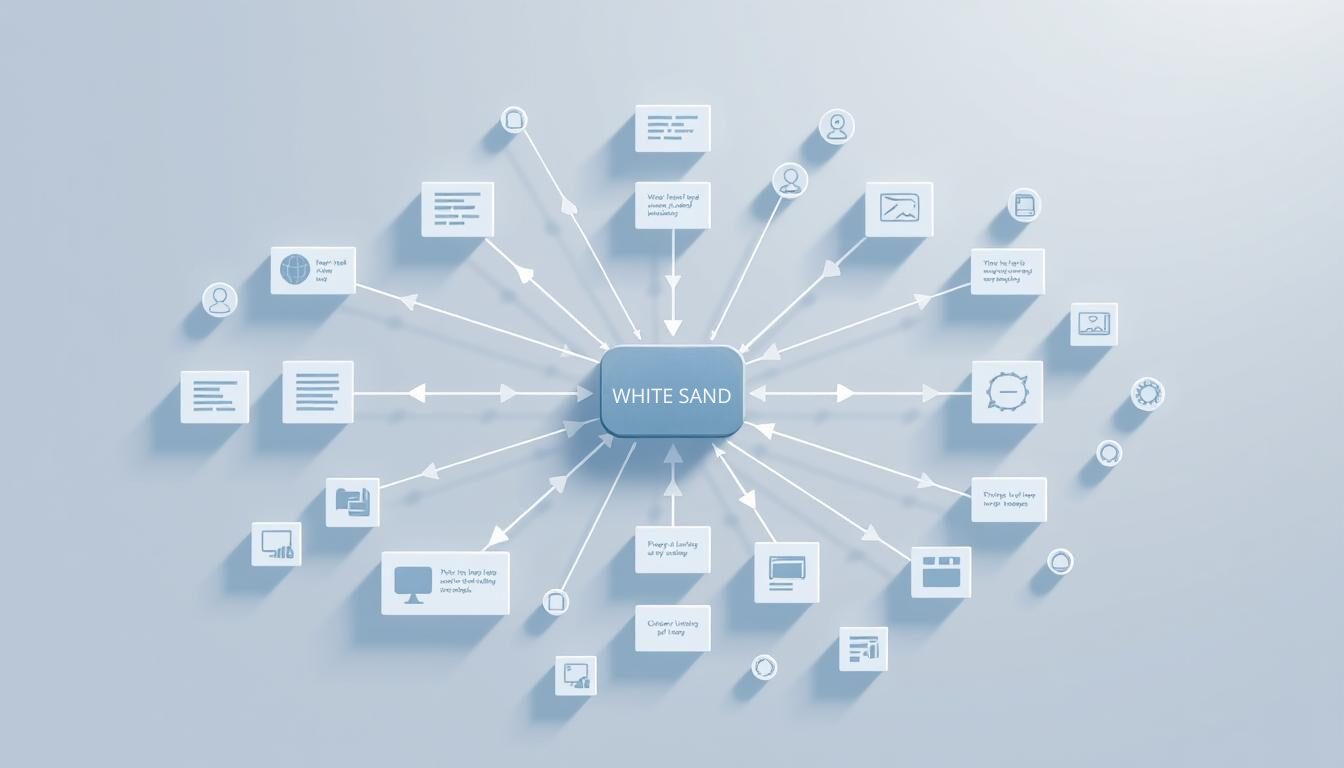
Our Guide to obtaining high domain authority for Better Rankings
Improving your website’s domain authority is crucial for achieving better rankings in search engine results. Developed by Moz, Domain Authority (DA) is a search engine ranking score that predicts how likely a website is to rank on search engine results pages (SERPs) compared to its competitors.
The domain authority score ranges from 1 to 100, with higher scores indicating a greater ability to rank. In this comprehensive guide, we’ll explore what domain authority is and why it matters for your website’s SEO performance. We’ll also provide actionable strategies to increase your authority and improve your website’s visibility in search results.
Key Takeaways
- Understand the concept of domain authority and its significance in SEO.
- Learn how to calculate domain authority and the factors that influence it.
- Discover strategies to improve your website’s authority and ranking.
- Clarify common misconceptions about domain authority and its role in SEO.
- Develop a clear roadmap for enhancing your website’s domain authority.
Understanding Domain Authority
Understanding domain authority is crucial for any SEO strategy. Domain authority is a metric that measures the credibility and trustworthiness of a website, which can significantly impact its search engine rankings.
What is Domain Authority?
Domain authority is a score that reflects the overall strength of a domain’s link profile compared to others. It’s calculated based on the number and quality of backlinks pointing to the domain. A higher domain authority score indicates a stronger link profile, which can improve a website’s visibility in search engine results.
How Domain Authority Differs from Google’s Ranking Factors
While domain authority is an important metric, it’s essential to distinguish it from Google’s actual ranking algorithms. Google doesn’t use domain authority in its ranking decisions, but many factors that improve domain authority, such as high-quality backlinks, also positively impact Google rankings. Domain authority provides a simplified view of website strength, whereas Google considers hundreds of factors, including user experience and content relevance.
Key differences between domain authority and Google’s ranking factors include:
- Domain authority is primarily link-based, whereas Google considers a broader range of factors.
- Domain authority provides a simplified view of website strength, while Google’s algorithms are more complex.
- Improving domain authority can be a useful proxy for understanding SEO performance, but it should be part of a holistic SEO strategy.
How Domain Authority is Calculated
The calculation of domain authority is a complex process that involves evaluating multiple factors related to your website’s backlink profile. This metric, developed by Moz, provides insight into a website’s credibility and ranking potential.

Key Factors in Domain Authority Calculation
Domain authority is calculated based on the quantity and quality of backlinks pointing to a website. Websites with a diverse and high-quality backlink portfolio tend to score higher in domain authority. The Moz algorithm assesses the authority of linking domains, with links from high-authority domains contributing more significantly to the overall score.
The Role of Backlinks in Domain Authority
Backlinks play a crucial role in determining domain authority. The concept of “link juice” refers to the value passed from one website to another through hyperlinks. Authoritative backlinks from multiple high-authority domains have a greater impact on domain authority than numerous links from a single source. Natural link acquisition is preferred over artificial link building for sustainable domain authority growth. Conversely, toxic or spammy backlinks can negatively impact your domain authority score.
By understanding these factors and focusing on earning high-quality backlinks, you can improve your website’s domain authority and enhance its search engine ranking potential.
What Makes a Good Domain Authority Score
Understanding what constitutes a good domain authority score is crucial for any SEO strategy. A good domain authority score is not a one-size-fits-all metric; it varies significantly across different industries and niches.
Industry Benchmarks for Domain Authority
Industry benchmarks play a crucial role in determining what a good domain authority score is. For instance, a DA of 30 might be exceptional in one industry but low in another. To set meaningful goals, it’s essential to look at the DA scores of your competitors in your specific niche and aim to surpass them.
Comparing Your Score to Competitors
Comparing your domain authority score to that of your competitors is a practical approach to understanding your standing. We’ll outline a process for identifying and analyzing your direct competitors’ domain authority scores. This involves using competitor domain authority as a benchmark for setting realistic improvement goals.
| Competitor | Domain Authority Score | Strategy |
|---|---|---|
| Competitor A | 40 | High-quality backlinks |
| Competitor B | 35 | Content marketing |
| Your Website | 30 | Improve internal linking |
By analyzing the gap between your domain authority and that of your competitors, you can identify opportunities to overtake them. Tracking changes in competitor domain authority scores over time is also crucial for adjusting your SEO strategies.
The Importance of Obtaining High Domain Authority
Achieving high domain authority is crucial for enhancing your website’s online presence. By analyzing your domain authority score, you can assess the effectiveness of your link-building efforts, benchmark your website’s performance against competitors, and identify opportunities to improve your online visibility and attract more organic traffic.

How Domain Authority Impacts Search Visibility
Domain authority significantly impacts your website’s search visibility. A higher domain authority score indicates a stronger online presence, making it more likely for your website to appear in search engine results. This, in turn, can drive more organic traffic to your site. By tracking your domain authority over time, you can gauge the effectiveness of your SEO efforts and make data-driven decisions to improve your online visibility.
Domain Authority as a Comparative Metric
Domain authority serves as a valuable comparative metric, allowing you to evaluate your website’s authority relative to your competitors. By comparing your domain authority score to that of your competitors, you can identify strengths and weaknesses in your SEO strategy and make informed decisions to improve your online presence. This comparative analysis can also help you set realistic expectations for your website’s ranking potential and prioritize your SEO efforts accordingly.
Effective Link Building Strategies for Higher Domain Authority

To achieve higher domain authority, it’s crucial to implement effective link building strategies. A well-crafted link building strategy not only enhances your site’s authority but also improves its visibility in search engine results.
Earning High-Quality Backlinks
Earning high-quality backlinks is a critical component of any successful link building strategy. This involves creating high-quality, relevant content that other reputable sites will want to link to. We recommend focusing on content that provides value to your audience, such as in-depth guides, research studies, or insightful articles. Additionally, engaging in guest blogging and leveraging relationships with other authoritative sites in your niche can help you earn high-quality backlinks.
Identifying and Removing Toxic Backlinks
Identifying and removing toxic backlinks is equally important as earning high-quality ones. Toxic backlinks can harm your site’s authority and negatively impact your SEO performance. We suggest regularly auditing your link profile using tools like Moz’s Link Explorer to identify potentially harmful links. Once identified, you can use Google’s Disavow Tool to address these toxic backlinks. It’s also essential to reach out to webmasters to request the removal of unwanted backlinks before resorting to disavowal.
Creating Link-Worthy Content
Crafting link-worthy content is a key component of an effective SEO plan that targets higher domain authority. To achieve this, we need to focus on creating valuable content that answers audience questions and solves problems.
Types of Content That Attract Natural Backlinks
Certain types of content are more likely to attract natural backlinks. These include:
- In-depth guides and tutorials that provide comprehensive information on a specific topic.
- Original research and data-driven content that offers new insights.
- Infographics that present complex information in a visually appealing format.
By creating such content, we can increase our chances of earning high-quality backlinks, thereby enhancing our website’s domain authority.
Content Promotion Strategies
Creating link-worthy content is just the first step; promoting it effectively is equally important. We can leverage various strategies to increase our content’s visibility and backlink potential.
| Promotion Strategy | Description |
|---|---|
| Social Media Amplification | Utilize social media platforms to reach a wider audience and attract potential linkers. |
| Email Outreach | Share content with influencers and website owners who might find it valuable. |
| Content Repurposing | Extend the reach of content by repurposing it across different formats. |

Technical SEO Improvements for Domain Authority

A well-optimized website is essential for achieving higher domain authority and better search engine performance. Technical SEO improvements play a crucial role in enhancing your site’s visibility and credibility online.
Site Structure Optimization
Optimizing your website’s structure is vital for improving user experience and search engine crawlability. A well-organized site structure helps search engines understand your content hierarchy, making it easier to index your pages. This, in turn, can lead to better rankings and increased domain authority. By streamlining your site’s architecture, you can improve internal linking, reduce bounce rates, and enhance overall user engagement.
Mobile Optimization and Page Speed
Google’s mobile-first indexing means that your website’s mobile performance is critical for search engine rankings. Ensuring that your site functions properly on mobile devices and loads quickly is essential. Page speed impacts both user experience and search engine rankings. Technical improvements such as implementing Accelerated Mobile Pages (AMP) or responsive design can significantly enhance mobile usability and performance. Tools like Google’s PageSpeed Insights and Mobile-Friendly Test can help you identify areas for improvement.
By focusing on technical SEO improvements, you can enhance your website’s domain authority by encouraging more engagement and links. A faster, more user-friendly site is more likely to attract natural backlinks, further boosting your domain authority.
Developing a Strong Internal Linking Strategy
Developing a robust internal linking strategy is crucial for enhancing your site’s domain authority. Internal links not only facilitate navigation but also play a significant role in distributing link equity throughout your website. By linking to relevant pages, you help search engine bots crawl and index your content more efficiently, which can lead to improved search visibility and, ultimately, a boost in domain authority.
How Internal Links Distribute Link Equity
Internal links are essential for spreading link equity across your website. When you link from one page to another, you’re essentially passing on authority from the originating page to the destination page. This helps in strengthening the overall authority of your site. For instance, linking from a high-authority page to a newer page can significantly enhance the latter’s visibility and credibility.
Best Practices for Internal Link Structure
To maximize the benefits of internal linking, it’s crucial to follow best practices. Use descriptive, keyword-rich anchor text for your internal links to provide context to search engines. Prioritize linking to cornerstone content and high-value pages to maximize their visibility. Additionally, avoid common mistakes like over-optimization and creating orphan pages. Utilize tools and plugins to identify linking opportunities and manage your link structure effectively. By doing so, you can create a robust internal linking strategy that supports your site’s domain authority growth.

Tools to Check and Monitor Domain Authority

Understanding your website’s domain authority requires the use of specialized tools. These tools help you monitor your domain authority score, identify areas for improvement, and track the effectiveness of your SEO strategies.
Moz’s Link Explorer and MozBar
Moz’s Link Explorer is a powerful tool for analyzing your website’s backlink profile and domain authority. It provides detailed insights into your link equity, anchor text distribution, and more. The MozBar, a browser extension, allows you to quickly check a website’s domain authority directly from your browser toolbar.
Alternative Domain Authority Measurement Tools
While Moz’s Domain Authority is a widely recognized metric, alternative tools offer similar measurements. Ahrefs’ Domain Rating and Semrush’s Authority Score are two such metrics that provide insights into a website’s authority. These tools can be used alongside Moz’s Domain Authority to get a more comprehensive view of your website’s performance.
For WordPress users, plugins like All in One SEO (AIOSEO) offer built-in domain authority monitoring capabilities through their Link Assistant addon, which generates internal link reports and suggests relevant pages to link to.
Common Misconceptions About Domain Authority
Domain authority, a metric developed by Moz, is often misinterpreted as a direct Google ranking factor. This misconception can lead to misguided SEO strategies that focus too heavily on improving domain authority without considering other crucial factors.
Domain Authority vs. Page Authority
One common confusion is between domain authority and page authority. While both metrics are used to predict ranking potential, they measure different aspects. Domain authority reflects the overall strength of a domain’s link profile, whereas page authority measures the strength of an individual page. Understanding the distinction is crucial for effective SEO.
| Metric | Description | Scope |
|---|---|---|
| Domain Authority | Measures the overall strength of a domain’s link profile | Entire Domain |
| Page Authority | Measures the strength of an individual page | Single Page |
Domain Authority is Not a Direct Ranking Factor
It’s essential to understand that domain authority is not a metric used by Google in its ranking algorithms. Statements from Google representatives have confirmed that they do not use domain authority or similar third-party metrics. Instead, domain authority correlates with ranking potential without being a direct cause of rankings. Focusing exclusively on domain authority without considering other SEO factors is a flawed approach.

By understanding these nuances, we can develop a more comprehensive SEO strategy that includes, but is not limited to, improving domain authority.
Conclusion: Building Domain Authority for Long-Term Success
To achieve long-term success in search engine rankings, building a strong domain authority is crucial. Throughout this guide, we’ve explored various strategies for enhancing your website’s authority, from effective link building to technical SEO improvements.
It’s essential to remember that domain authority growth is a long-term process that requires patience and consistent effort. By adopting a holistic approach that incorporates multiple strategies, you can improve your website’s authority over time.
The connection between domain authority and sustainable organic traffic growth is significant. As your domain authority increases, so does your website’s visibility in search engine results, leading to more traffic and potentially better business performance.
To get started with improving your domain authority, focus on creating high-quality, link-worthy content and prioritize technical SEO improvements. For more information on enhancing your domain authority or to learn more about our SEO services, contact us at deepali@whitesand.co.in or call (+91)98259-40020. Visit our website at https://whitesand.co.in/.
By following these strategies and maintaining a consistent effort, you can enhance your website’s domain authority and improve your online presence over time.
FAQ
What is a good score for domain authority?
A good score for domain authority varies by industry, but generally, a score above 50 is considered good, and above 70 is considered excellent. We can compare our score to that of our competitors to determine where we stand.
How often is domain authority updated?
Domain authority is updated periodically by Moz, typically every few weeks. This means that changes to our backlink profile may not be reflected immediately in our domain authority score.
Can I improve my domain authority score quickly?
Improving domain authority score takes time and effort. We can improve our score by earning high-quality backlinks, creating link-worthy content, and optimizing our site structure. However, quick fixes or manipulative tactics can actually harm our score.
How does domain authority differ from page authority?
Domain authority measures the credibility of our entire website, while page authority measures the credibility of a single page. Both are important metrics, but they serve different purposes.
Is domain authority a direct ranking factor for Google?
No, domain authority is not a direct ranking factor for Google. However, the factors that contribute to domain authority, such as backlinks and content quality, are also important for search engine rankings.
Can I check my domain authority score for free?
Yes, there are several tools available that offer free domain authority checks, including Moz’s Link Explorer and other SEO tools. We can also use these tools to monitor our competitors’ domain authority scores.
How can I identify and remove toxic backlinks?
We can use tools like Moz’s Link Explorer to identify toxic backlinks and then take steps to remove them. This can involve contacting the site owner or using Google’s Disavow Tool.
What types of content attract natural backlinks?
High-quality, informative, and engaging content is more likely to attract natural backlinks. This can include blog posts, infographics, videos, and other types of content that provide value to our audience.
